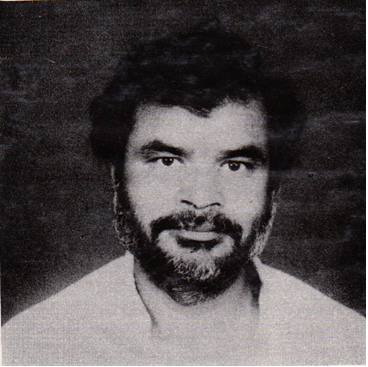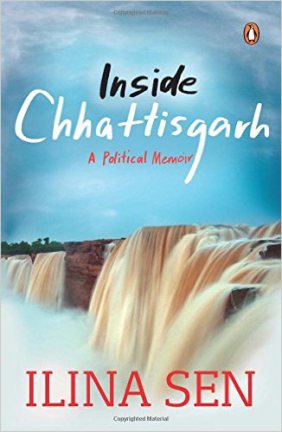Shankar Guha Niyogi: The Man Who Showed Us How Development Should Look Like
By Lalit Shukla
30 September, 2015
A Song For Next Day!

Shankar Guha Niyogi
Shankar Guha Niyogi, born in Asansol on 14 February, 1943, did his schooling in Calcutta and Jalpaiguri and involved himself in left politics in late fifties. Later he shifted to Bhilai, Chhattisgarh as a worker in Bhilai Steel Plant. There he started organizing working class against exploitation and associated with Coordination Committee of the Communist Revolutionaries. He lost the job due to leading organizational activities and popularity among workers. He left Bhilai and roamed around in forests of Chhattisgarh trying different occupations keeping main motive in mind to organize working class. In Dahni Tola, he met Asha and married. He was arrested during period of the Emergency for thirteen months. After coming out of prison, he moved to Dalli Rajhara and founded the Chattisgarh Mines Shramik Sangh (CMSS) in 1977.
CMSS not only led struggle for higher wages and better working conditions but also closely engaged with total life of workers. One of the important achievements of CMSS was its anti-alcohol campaign involving large number of women. Kusumbai, vice-president of workers’ union, died from a ruptured fallopian tube due to lack of health facilities in Dalli Rajhara in 1980. To fulfill the urgent need of a hospital and maternity home to avoid unnatural deaths, union started running a dispensary in 1981 and then by 1983 it developed a fifteen bed hospital with modern facilities with the savings and voluntary work of members. Dr. Binayak Sen and Dr. Ashish Kundu were the first to lead to make Shaheed hospital a reality and by 1994 it expanded to a 60 bed hospital. For education, the union built school buildings with voluntary labour and savings of workers and later gave it to government to run the schools. CMSS led successful struggle to provide sanitary facilities in worker’s ‘bastis’. This promising creative struggle for an alternative development attracted many youth activists from different part of country to participate and contribute. To cover wider aspects of working class, CMSS formed its political front as Chhattisgarh Mukti Morcha (CMM).
 Dr. Ilina Sen, well-known social activist and feminist scholar, who spent many year in Chhatisgarh working with the movement have written extensively about activities of CMSS and CMM in her political memoir ‘Inside Chhatisgarh’ published by Penguin Books in 2014.
Dr. Ilina Sen, well-known social activist and feminist scholar, who spent many year in Chhatisgarh working with the movement have written extensively about activities of CMSS and CMM in her political memoir ‘Inside Chhatisgarh’ published by Penguin Books in 2014.
Since 1991, Niyogi was more focused to organize industrial workers which mean a more direct fight to ruling class of industrialists. On 28th September 1991, he was shot dead while asleep in his house in Bhilai. Niyogi’s wife accused nine prominent industrialists for conspiracy of his murder. Niyogi was aware of dangers to his life. Few weeks before his death, he recorded a message in which he had said, “This world is beautiful and I certainly love this beautiful world, but my work and my duty are important to me. I’ve to fulfil the responsibility that I’ve taken up. These people will kill me, but I know that by killing me none can finish our movement.”
A Citizen’s Committee conducted a detailed inquiry into the circumstances surrounding Niyogi’s murder. The Committee consisted of D.S.Tewatia, ex-Chief Justice of High Court; Kuldip Nayar, senior journalist; Vijay Tendulkar, well-known playwright; Anil Sadgopal, educationist and social activist; and Rakesh Shukla, Supreme Court lawyer. The Committee’s report entitled ‘Behind the Industrial Smokescreen’ stated that:
“He (Niyogi) was killed because he was an odd man out in an area where none had dared to challenge the network that some industrialists operated to deny their workers even basic amenities and living wages Shankar Guha Niyogi’s murder assumes sinister proportions when seen in the context of the rapidly changing industrial scenario in the country, under pressure from the World Bank and the International Monetary Fund. It is reflective of the drastic erosion in the democratic space open to the workers to agitate for rights assured by various industrial and labour laws, in asking for minimum security of employment and a wage which stretches the notion of dignified survival to its limit The establishment would go along with all this in order to ensure that the outside banking institutions and multinationals stayed and prospered. A person like Niyogi, with a vision of self-reliance and alternative development of Indian society, will then be missed more than ever before”.
Along with struggle for higher wages, health facilities, and education for working class, Nigoyi took up the issues as environment and development quite seriously. Union launched many awareness programs as “Know Your Jungles” and “Revive the Jungle” and led several agitations for reform in policies for rights of Adivasi people. Here is an extract from his article “Our Environment” translated in English by Rajani Bakshi:
“This river, this air, this mountain, this jungle, these chirping birds — this is our land (desh). We will take the help of science to move our world forward, but we will also ensure that the rivers remain clean and flow freely and that there is pure invigorating air. We will always need to hear the melodies of birds which kept our ancestors one with nature.”
“When the people are able to feel and know that the jungle is truly theirs, from that day every one of them – even the little children — will keep a watchful eye and protect the forests. Then the forest thieves will be stopped and the ills created by useless and irresponsible officials will be undone. When the forest becomes a means of preserving collective well-being then all its dwellers will act against every stroke of any axe used to cut trees illegally. Such protection of community interest will in turn secure the national interest. This will not only protect the environment but also guarantee the future of humanity.”
“The truth is that we will have to protect our earth and our planet. The trees, plants, clean drinking water, clean air, birds and animals and human beings – together all of us form part of this world. Through sensitive ideas and flexible programmes we will have to maintain a balance in nature and in science and this can be done on the basis of the development of people’s consciousness.”
CBI investigated Niyogi’s murder case and charged nine people. While three were acquitted by trail court in 1997 due to lack of evidences while Simplex industries owner Moolchand Shah, Oswal Iron and Steel Private Limited owner Chandrakant Shah, Gyan Prakash Mishra, Abhay Singh and Awadesh Rai was charged under Section 302 of the Indian Penal Code (IPC) with Section 120-B (criminal conspiracy) and awarded life imprisonment and a fine of Rs 10 lakhs to each of two industrialists. Paltan Mallah, the hired killer, was sentenced to death by trial court. In June 1998, Madhya Pradesh High Court acquitted all convicts. Both CBI and CMM appealed in Supreme Court against acquittal. The Supreme Court Bench, comprising Justices K.G. Balakrishnan and A.R. Lakshmanan, acquitted industrialists Moolchand Shah owner of Simplex industries and Chandrakant Shah owner of Oswal Iron and Steel Private Ltd and convicted Palton Mallah, the hired killer, for murder of Niyogi and sentenced him life imprisonment. The workers of Chhattisgarh under legendary leadership of Niyogi have struggled for rights under the framework of low and order. But the acquittal of industrialists by higher courts in light of enough evidences of conspiracy of murder acknowledged by trial court have certainly affected people’s faith in rule of law.
To carry forward the neoliberal agenda, started from 90s Indian state made quite clear that such alternative development model will not be tolerated. Development has been redefined as corporate development where labour laws are being diluted, state is least concerned about health, education, and environmental destruction. Mining is their main agenda. The people who are resisting illegal undemocratic corporate mining are being declared as Naxalites, Maoist, or extremists and being hunted by state forces. To create good investment climate and to kill the voice of dissidence, Operation Green Hunt was launched in 2009 which is still active after more than five years. In the name of war on left wing extremism, paramilitary and state forces torture innocent tribal, rape women, and kill people in fake encounters which gift them prizes and promotions.
Niyogi struggled throughout his life for an alternative development under the rule of law. His work is a great example to learn how development should look like. In present conditions, when thinking of alternative development makes you threat to national security, state is protecting only corporate interests and justice is not available to poor and underprivileged, people are bound to revolt. An open war is going on between a powerful state equipped with modern arm technologies and poor people struggling for their survival. We have to take side and clear our politics. There is no other way.
Lalit Shukla is a researcher and writer based in Ahmedabad, India. Email: [email protected]. His blog is https://asongfornextday.wordpress.com
Comments are moderated


